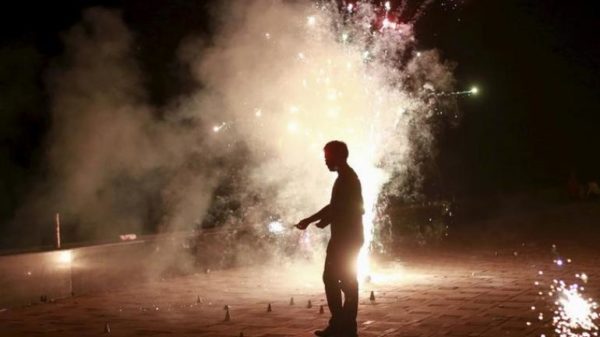he Supreme Court has refused to impose a nationwide blanket ban on sale of firecrackers. In its verdict today, the court said only ‘green firecrackers’ (which are less polluting) will be allowed to be sold.
In its order, the court banned the online sale of firecrackers and put a stay on e-commerce portals from selling them.
The court said only “low polluting” green crackers which are within permitted decibel limits and emission norms will be allowed.
The court also imposed timing restrictions on burning firecrackers on Diwali. The court said people will be allowed to burn crackers between 8pm and 10 pm on Diwali. On New Year and Christmas, the timing is from 11:45 pm to 12:15 am.
The court has also directed all states to explore feasibility of community cracker bursting during festivals.
The Supreme Court’s verdict came in response to a plea seeking a ban on manufacturing and sale of firecrackers across the country to curb air pollution.
This comes 15 days ahead of Diwali (November 7).
The matter was heard by a bench of Justices AK Sikri and Ashok Bhushan. On August 28, the bench had reserved its verdict.
Here are 10 thing that you should know:
1) On October 9 last year, the Supreme Court temporarily banned the sale of firecrackers ahead of Diwali.
2) The court refused to relax its order and dismissed a plea moved by traders. In wake of the temporary ban, the traders were seeking permission to sell crackers for at least a day or two before Diwali last year.
3) The court had said that the limited ban on firecrackers during Diwali was an experiment to examine its effect on the pollution levels.
4) In the past, the Supreme Court had said that while deciding on a ban on firecrackers, it is important to take into account all aspects, including the fundamental right of livelihood of firecracker manufacturers and the right to health of over 1.3 billion people of the country.
5) The court had said that Article 21 (right to life) of the Constitution applies to both segments of people (firecracker manufacturers and general public) and it needs to maintain a balance while considering a countrywide ban on firecrackers. For this, the court also asked the central government to suggest ways through which pollution can be curbed and what will be the effect of firecrackers on the public at large.
6) On August 8 this year, the court observed that a spike in PM 2.5 levels in the air is a severe problem as the particulate matter remains in people’s lungs, leading to serious health implications.
7) In their contention, firecrackers manufacturers had argued that the use of firecrackers should not be completely banned. They said their use should rather be strictly regulated.
8) On whether firecrackers are the main contributors to air pollution in the national capital and adjoining areas during winter, the manufacturers contended that crackers are not the reason for increase in air pollution. They said there are other factors, like wind and temperature, which contribute to it.
9) They have said the firecracker manufacturers can be deprived of their right to do business based on statements which were not supported by facts.
10) Every year during winter, the air quality in Delhi worsens to alarming levels, turning the city into a gas chamber. Stubble burning in Punjab and Haryana, along with firecrackers during Diwali, vehicular pollution and construction activities are the primary reasons for this.



Leave a reply